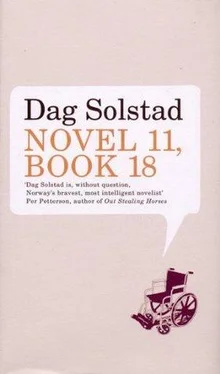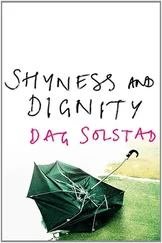Another reason why Bjørn Hansen invested his position as treasurer at Kongsberg with a seriousness just short of fervour from the very first day, was that this was his work. He had applied for a position and got it. It was not his mission in life, but his job. In Bjørn Hansen’s view, work was a necessary evil. As mentioned already, he chose his field of study on the basis of which necessary evil he wanted to qualify himself for. When the job was done, one could devote oneself to life’s true meaning, which for Bjørn Hansen was clearly a woman. Living with a woman, Turid Lammers. But first one is obliged to participate in the communal public enterprise that is called work, in order for the wheels to keep turning, society to function, in short, so that there will be steak at the butcher’s, schools for children and young people, clothes to put on, light switches in the halls, running water in the taps, radios, on which someone has undertaken to speak, others to make, still others to transport to the store, which someone has decided to open, and when the radio breaks down someone has taken on the task to repair it, allowing the wheels to turn; and when the snow falls on Kongsberg, the excavators are wolfing down the compact banks of snow to allow new snow to pile up, forming fresh banks at the edges of the road, in order for the wheels to continue turning. In the middle of all this, Bjørn Hansen had assumed the task of managing the office that collected the resources necessary for operating the municipality and the State. He had become the State’s unrelenting tax collector in this provincial town. A stern servant of the State.
Kongsberg is situated in the middle of Norway by the river Lågen, which runs in a lovely arc through the town and separates Old Kongsberg from New Kongsberg. A handsome bridge connected the two old towns, which were decorated with realistic sculptures in praise of work, like mining and rafting. The modern centre strongly resembled all other Norwegian towns, its main streets lined with shops where you could buy, in abundance, what modern civilisation had to offer, from knitting needles to the latest computer models. This was the bustling part of town. The old centre housed most of the city administration, surrounded by decayed wooden buildings from the old days — this was in the early 1970s. A magnificent church on a hill. A venerable police station in an old patrician villa. A dismal prison, along with the rest situated around the church square. Also the fire station, not to forget the Town Hall with its varied functions.
The town was built up around the silver-mining industry. The kingdom of Denmark-Norway’s only silver mines were located here, and so, in the sixteen hundreds, Christian IV laid the foundation of the town. Thousands of workers and German mining experts, along with Danish officials, lived here. It was nicely situated, surrounded by hills that were green from spring to autumn and white in the winter. The river was blue from spring to autumn and white with ice in the winter. Here lay the Kongsberg Arms Factory and the Royal Mint — which was still producing Norwegian coins — together with other enterprises. There were shops, tradesmen, dentists, attorneys, physicians, functionaries, shop girls, office girls, teachers, municipal employees — and workers. And all of them had to pay taxes.
Bjørn Hansen made himself at home in the town in a surprisingly short time. Even as treasurer. Shortly he had acquired a nodding acquaintance with a number of people he met in the street on his way from the Lammers villa to the Town Hall, where the Treasury was located. He passed this way twice a day, first in the morning, to the office, then in the afternoon, from the office. He spent most of his working hours in the office, interrupted by meetings at the alderman’s, where he presented economic reports on the tax revenues to date, while showing how they tallied with the prognoses made in the budget. It was a pleasant life — the job entailed responsibility but was not stressful. It was, on the whole, a set of routines, and if you knew them, everything ran more or less by itself. Not once did he take work home with him. He felt he was met with friendliness everywhere. Few appeared to think of him as an awe-inspiring government authority who ruthlessly cracked down on failure to pay tax arrears and on deficient payment of value-added tax. Few appeared to think of the fact that, when he wrote his name, his signature, on an official sheet of paper, it meant that the government was now demanding its due and would brook no argument. Armed with a sheet of paper with Bjørn Hansen, Treasurer on it, his subordinates marched off, rang the bells of private homes, entered courteously and, without listening to any protests, took away TV sets, pieces of furniture and paintings as government security against unpaid tax. He even had businesses and industrial concerns declared bankrupt, with all the consequences this had not only for the unfortunate owners, but even more, it turned out, for those who had worked by the sweat of their brows in these businesses and concerns. Yet when he walked through the streets, people greeted him like a friend, and he returned their greetings in a friendly manner. Despite rumours of internal conflicts in the Treasury, where he, an outsider, was opposed by two venerable and loyal Kongsberg drudges, the new treasurer had a nodding acquaintance with a considerable number of people. It was partly due to the fact that in his line of work he came into contact with many of the town’s inhabitants, not least businessmen and people who held public office, but the main reason was that most of those he greeted were members of the same society as he himself, namely, the Kongsberg Theatre Society.
Yes, he had become a member of the Kongsberg Theatre Society, even an enthusiastic member. It was Turid Lammers who had got him involved. She had acted in amateur theatre in her early youth and, having now returned to her roots, she wasted no time in joining the Kongsberg Theatre Society, of which many of the friends from her youth were still members. During the years she had been away Turid Lammers had done things and improved herself. She had studied theatre, both in Norway and in France, and now taught drama at the Kongsberg Secondary School, in addition to the more common subjects of English and French. She was an asset from day one and had been accepted with open arms; it was not long before she suggested that Bjørn Hansen should join them. He hesitated, telling her that he was not an actor, but she replied that there were so many other things he could do; it was first and foremost a question of being part of a milieu. But Bjørn Hansen thought that if he were not an actor he would be somehow second-rate in that milieu, and he did not want that. Turid protested loudly, saying she was convinced that he could become a good actor, he simply hadn’t tried. Besides, they were all equals in the Kongsberg Theatre Society, that was a principle; the main roles were given out by turns, so that everyone got involved; and, of course, there were also so many other things that had to be done to put on a whole evening’s entertainment. The upshot was that Bjørn joined the Society, accompanied his partner to rehearsals, took out membership, and found himself an insider.
The Kongsberg Theatre Society put on one production a year. They played it six times in late autumn at the Kongsberg Cinema, after having been in preparation since Christmas the previous year. Bjørn Hansen’s first job was as a sort of odd-job-man-cum-stagehand. He ran errands, took care of applications, helped organise the ticket sales, served as cashier, helped to prepare the budget, and talked up the coming performance at the Treasury and the Town Hall, and during the performance he could be found behind the scenes busily moving scenery and changing the sets while the curtain was down, and everyone in the auditorium could hear the shuffling of heavy furniture being dragged across the stage, and a loud thud as an armchair was put down by a perspiring Bjørn Hansen. Who, in the next moment, when the curtain went up again, found himself backstage, anxiously waiting to see how the next scene would go, whether the public would be drawn in, whether the singing dentist, Herman Busk, would transcend himself this evening as he nervously took his last steps towards the footlights, past Bjørn Hansen, who, deeply moved, whispered ‘Good luck’, barely audible to anybody but himself.
Читать дальше












